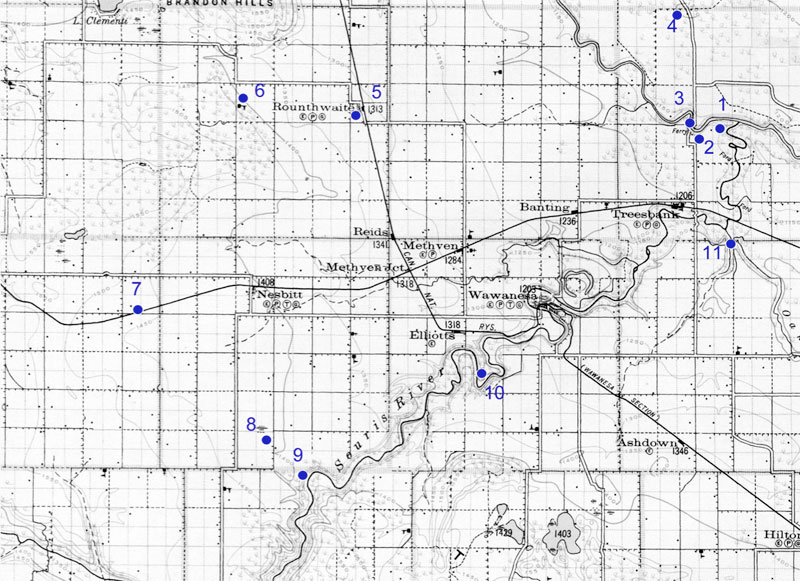1. Souris Mouth / Two Rivers
A Land Titles Office and Post Office were established at Souris Mouth,
also called Two Rivers, in 1876 to meet the needs of a large territory
beyond what was then the western boundary of Manitoba that was just to
be surveyed in preparation for settlement.
Sec. 16, Twp. 8, R. 16 - 1880-11-01
2. Land Tiltes Building
The former Land Titles Office and Post Office
on NE 16-8-16, about a km west of its original location. (likely NE
17-8-16) in 1887.
Built ca. 1880, it is the only existing Land Titles Office from the
settlement era. Used as part of residence – has an old safe used by the
Land Titles / Post Office.
3. Treesbank Ferry (RM of South Cypress)
The first Treesbank Ferry gave access to the Dominion Land Office of
1880 on the west side of the Assiniboine River, just up from the mouth
of the Souris River. It served the area at this location until the
railway came to Treesbank. It was then moved upstream to NE17-8-16W and
known as Clark’s Crossing. In 1898-99, the Rural Municipality of South
Cypress constructed a road, built a new ferry, and took over its
operation. When the Treesbank Bridge opened 21⁄2 miles upstream, in
September 1989, this long-established crossing closed after 109 years
of service.
4. Criddle-Vane Homestead (RM of South Cypress)
The buildings on this site formed the homestead of English immigrant
Percy Criddle and his wife and children, along with Mrs. Elise Vane and
her children. They arrived in western Manitoba in 1882. Also known as
Aweme (the basis for which is unclear although some stories maintain it
is a truncation of “Awe Me”), the Criddles and Vanes tried to recreate
a genteel English landscape in the Carberry sand hills, building a
tennis court and golf course, among other amenities. Percy and his
children were active naturalists, and his sons Norman Criddle and
Stuart Criddle were acclaimed for their work in entomology,
horticulture, and other pursuits.
5. Rounthwaite
Rounthwaite (officially Naughton) was established on SW 23-8.18 about 2
km west of the present site. St. John the Divine Anglican Church (now
at the Sipiweske Museum) was built there in 1882. The Post Office with
Samuel Rounthwaite as Postmaster was about 1 km. south.
The village was relocated after 1890 to be on the Wawanesa - Brandon RR
line.
6. Original Rounthwaite Site
7. Minnewawa
The Post Office was first in the home of Mr. & Mrs. Young. Came
from Carroll – one carrier was Mr. Crompton. It closed when Nesbitt
opened. A school and cemetery were established.
8. Whitehead
The Charles Kent Store - the Settlement also known as Whitehead
Charles Kent NE 4-7- 18 (No record of a Post
Office but C. Kent operated the Bertha PO.
9. Gregory’s Mill
In 1883, John Gregory (c1828-1896) from Wingham, Ontario arrived in
Manitoba and took up a homestead claim on 34-6-18 west of the Principal
Meridian, in the Rural Municipality of Riverside. Near his home on the
banks of the Souris River, Gregory constructed a three-storey stone
mill, powered by river water held by an earthen dam, with a steam
engine installed later as a backup during periods of low water.
10. Souris City
In 1881, a little village called Souris City, was created on the
flats of the Souris River, South of where Provincial Trunk Highway #2
crosses the Souris River. (16-7-17)
A plan of the village was registered in the Land Titles Office in
Brandon. The village was completely laid out with surveyed streets and
lanes. A plan of this village is available at the Oakland Municipal
Office at Nesbitt, Manitoba. At one time the village population
numbered 54 persons.
11. Millford
Most histories credit Millford as being the first place to get mail
delivery in the southwestern corner of Manitoba, in effect, with being
the first village south of the Assiniboine in the Westman area. Mail
came via steamboat at first, and later over land. Millford appears on a
route for mail delivery in an 1884 map.
|



